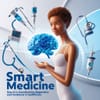Artificial intelligence (AI) is revolutionizing the healthcare industry, transforming the way doctors diagnose and treat patients. AI-powered technologies are being used to analyze medical data, identify patterns, and make predictions, enabling healthcare professionals to provide more accurate and personalized care.
One of the key areas where AI is making a significant impact is in medical imaging. AI-powered algorithms can analyze medical images such as X-rays, CT scans, and MRIs, to help doctors detect diseases such as cancer, diabetes, and cardiovascular disease more accurately and at an earlier stage.
AI is also being used to develop personalized treatment plans for patients. By analyzing a patient's medical history, genetic profile, and lifestyle, AI-powered systems can recommend tailored treatment options that take into account the individual's unique characteristics.
Another area where AI is being used is in predictive analytics. AI-powered systems can analyze large amounts of medical data to identify patterns and predict patient outcomes. This can help doctors identify high-risk patients and provide them with early interventions, reducing the risk of complications and improving health outcomes.
Furthermore, AI-powered chatbots and virtual assistants are being used to provide patients with personalized support and guidance. These chatbots can help patients manage their conditions, answer questions, and provide emotional support, reducing the burden on healthcare professionals and improving patient engagement.
The use of AI in healthcare also raises important questions about data privacy, security, and ethics. As AI-powered systems become more widespread, it is essential to ensure that patient data is protected and used responsibly.
AI is transforming the healthcare industry, enabling doctors to provide more accurate and personalized care. As AI-powered technologies continue to evolve, it is likely that we will see even more innovative applications in the future, leading to improved health outcomes and better patient care.


